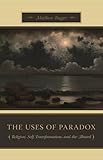The uses of paradox : religion, self-transformation, and the absurd / Matthew Bagger.
Material type: TextPublisher number: EB00639545 | Recorded BooksPublication details: New York : Columbia University Press, ©2007.Description: 1 online resource (xiii, 132 pages)Content type:
TextPublisher number: EB00639545 | Recorded BooksPublication details: New York : Columbia University Press, ©2007.Description: 1 online resource (xiii, 132 pages)Content type: - 023151185X
- 9780231511858
- 200 22
- BC199.P2 B34 2007eb
- online - EBSCO
| Item type | Current library | Call number | URL | Status | Notes | Barcode | |
|---|---|---|---|---|---|---|---|
 eBook
eBook
|
Biblioteca "Angelicum" Pont. Univ. S.Tommaso d'Aquino Nuvola online | online - EBSCO (Browse shelf(Opens below)) | Online access | Not for loan (Accesso limitato) | Accesso per gli utenti autorizzati / Access for authorized users | (ebsco)224633 |
Browsing Biblioteca "Angelicum" Pont. Univ. S.Tommaso d'Aquino shelves, Shelving location: Nuvola online Close shelf browser (Hides shelf browser)
Includes bibliographical references and index.
Introduction: Paradox without piety -- Credo quia absurdum : cognitive asceticism and Kierkegaard -- Mystics and ascetics -- Absolute transcendence -- Skepticism and mysticism.
Print version record.
In this groundbreaking comparative study, Matthew Bagger investigates the role of paradox in Western and Asian religious discourse. Drawing on both philosophy and social scientific theory, he offers a naturalistic explanation of religion's oft-noted propensity to sublime paradox and argues that religious thinkers employ intractable paradoxes as the basis for various techniques of self-transformation. Considering the writings of Kierkegaard, Pseudo-Dionysus, St. John of the Cross, N?g?rjuna, and Chuang-tzu, among others, Bagger identifies two religious uses of paradox: cognitive asc.
In English.









